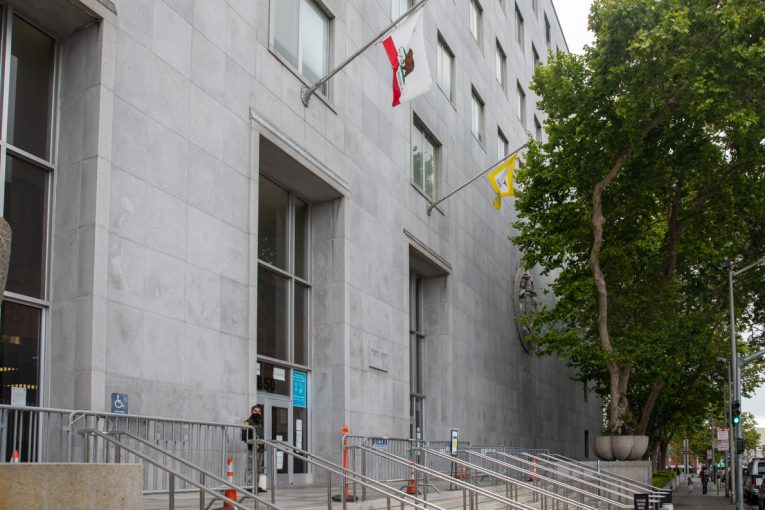
 By Alana Bleimann
By Alana Bleimann
SAN FRANCISCO, CA – Eleven years after apparently being racially profiled on an airplane for wearing baggy pants, Deshon Marman finds himself stuck in a never-ending cycle of incarceration.
Thursday, the justice system’s ability to create and maintain the criminality of Deshon Marman was on full display at his pretrial motion hearing in San Francisco Superior Court.
Marman was present in custody with his mother seated just a few rows behind him, behind the bench. Occasionally, the two would exchange looks of pain but reciprocate them with slow loving nods, indicating reassurance for each other.
Marman is being charged with attempted assault with infliction of great bodily injury. His trial is set for later this month.
But his troubles started back in June of 2011, when the 20-year-old African-American boarded an airplane leaving San Francisco, headed toward New Mexico. The young man was a star football player at the University of New Mexico, but never made it back to the field that day.
From video footage captured on the airplane, Marman can be seen calmly and peacefully sitting in his seat by the window.
The airplane’s captain and one police officer approach him and ask him to pull up his pants.
When he boarded the plane, Marman’s pants “were below his shorts…in full view of the traveling public,” Sgt. Michael Rodriquez of the SFPD explained to ABC News in 2011. But Marman’s “underwear was covering his private areas,” noted reports, calling into question why he was charged with indecent exposure.
In the video, Marman appears calm and tries to explain to the officer and the captain why his pants were sagging and that his intention was not to be disrespectful to other passengers.
“I didn’t do nothing to nobody, sir,” he told the captain, “I was wearing pajama pants, and I had my bag….I told her [flight attendant] that once I sat down everything would be taken care of.”
After being asked to pull his pants up by a flight attendant, Marman respectfully told her that because he was carrying multiple bags, he could not pull them up at that exact moment.
“I ain’t breaking the laws, I ain’t touch nobody, so if I ain’t touch nobody and not breaking the laws, they [police officer] don’t need to be here and they can’t put their hands on me or touch me if I’m not breaking the laws…I know my rights. I know mine. Thank you,” Marman stated.
The young man was also charged with one count of trespassing because he refused to depart the plane.
According to Sgt. Rodriquez and CBS SF Bay Area, “Eventually the plane’s captain told other passengers on the aircraft to deplane, ordered Marman to leave the plane and then placed him under citizen’s arrest for trespassing after he refused the order.”
Marman was then escorted off the plane by police “and then allegedly resisted officers when they tried to handcuff him,” who claimed injuries, a “cut to his hand and a sprained knee,” according to CBS SF Bay Area.
Marman’s current public defender, Diamond Ward, was able to convince the court to drop the great bodily injury felony charge to a misdemeanor charge, as no injury was actually inflicted upon the victim(s) at the time of the incident.
Judge Brendan Conroy began the hearing by going through multiple fire department and Sutter Health records of Marman, who has been diagnosed with PTSD, and his health records are important to the development of the case, said PD Ward.
An “unconscious fight or flight that people feel” from mental health issues such as PTSD can trigger harmful actions, Ward argued.
A 2019 Prison Policy Initiative report, entitled “Arrest, Release, Repeat,” found that “[i]ndividuals with multiple arrests were three times more likely to have a serious mental illness, and were less likely to have access to health care.”
Ward also made note of “homelessness,” but didn’t want to bring any detail of this to the jury’s attention. Additionally, Ward said he won’t note that Marman was a “peaceful person” and does not plan on bringing any character witnesses or statements onto the courtroom floor.
If claims are made that he is a peaceful person, the People, represented by Assistant District Attorney Asit Pahwala, plan to describe to the jury how Marman once allegedly bit a police officer.
Judge Conroy then brought up Marman’s prior conviction in 2015 and “an incident” in 2017 because he was concerned the prosecution may introduce these matters, claiming it would paint the defendant “as someone who is always assaulting others.”
“I ask that it be excluded entirely,” Ward stated, adding, however, the “officer’s character of violence” is relevant for the jury to hear and should be brought to light.
Specifically, the officer that Marman had interacted with “had used excessive force in the past,” said PD Ward.
“Mr. Marman has a lot of positive things in his life,” Judge Conroy stated, adding the jury should hear every side to his story. He ruled the 2017 incident will not be used during trial.
Judge Conroy wrapped up the hearing by stating that both Ward and Pahwala should refer to the defendant as Mr. Marman rather than Deshon because “everyone should be treated respectfully, which I know the lawyers don’t do.”
During trial Marman may or may not take the stand, but a list of potential witnesses have been made and the jury will be selected on the week of Sept. 20 and opening statements will begin by Sept. 23.
Deshon Marman’s story of a never-ending cycle of incarceration is not a unique one, and in fact it is very common, as about “44 percent of released prisoners” in 30 different studies state those convicted “were arrested during the first year following release,” according to a 2018 recidivism report by the U.S. Department of Justice.
Social justice critics charge this is how the system creates its own criminals, and “Arrest, Release, Repeat” suggests that, instead of constantly arresting citizens, police should “issue citations” and guide people to “service providers…and away from jails.”
Decarceration advocates could hold Marman up as a prime example of the high U.S. recidivism rates, noting that if Marman was never charged for indecent exposure and trespassing in 2011, charges that could have been reduced to a citation, he might not be sitting in a courtroom 11 years later looking fatigued and exhausted, fighting for his life with his mother and an empty audience sitting behind him.
